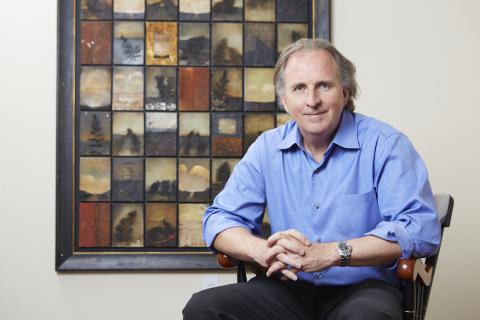A Minute with Roger H. Brown

As Berklee President Roger H. Brown prepares to step down from his role at the end of June, he took a minute to speak with Fritz Kuhnlenz, senior director of Alumni Affairs, to reflect on his tenure at the school.
Q: Your career has spanned so many different fields, industries, and types of work. What advice would you give this year's class of graduating students?
Brown: My advice to alumni of all ages, but especially the young alumni, is to be open to what your destiny is, because chances are pretty good you don't yet know what it is. I think it will reveal itself as you put yourself into situations that are appealing to you and allow you to express your skills and your passions. There are few people in life (I’ve never been one of them) that say “I want to be a doctor” and they go become a doctor, or “I want to be a film composer” and they go become a film composer. If you are one of those, more power to you, but I would say 95 percent of my friends and I used some hot-or-cold aimless wandering to figure out where we would end up in our careers.
Q. Looking back on the thousands of concerts and performances you have witnessed at Berklee, are there any standouts or ones that you will remember for years to come?
Brown: So many of them! There was a great moment at Symphony Hall where we had Esperanza Spalding, who I think was still a teenager, and Roy Haynes, who was in his 80s. We had someone from every decade in between who was a luminary jazz artist on stage. I just felt so proud that we were bringing that to the city of Boston. Bringing those people together on our stage was a great moment. And who can forget any one of Tia Fuller’s many student ensemble concerts?
Q: The past year has been incredibly challenging for the music and entertainment industries. Looking ahead when it is safe and allowed to gather in large groups, if you get to choose, what will be your first concert to attend in a post-pandemic world?
Brown: I had been planning to go to the Telluride Bluegrass Festival, which is the intersection between one of the world's most beautiful physical places and amazing acoustic music. I’m hoping to get back out there. I do want to go back to the Umbria Jazz Festival. Hearing the likes of Herbie Hancock and John Scofield in these ancient Italian opera houses at midnight is such a fantastic experience. Since the pandemic, I’ve had a good time exploring all the nooks and crannies of the streaming world. I discovered that all the hit music from when I was a schoolteacher in Kenya is available on Apple Music—obscure songs that even people in other parts of Africa don't know. I made a playlist and it just takes me right back to being a 21-year-old teacher there. I also have spent some energy writing and cowriting songs. It has been a fun process to challenge myself and work with some of our songwriting faculty and others.
Q: As Berklee president you have met a significant number of famous musicians and artists throughout the years. Does any encounter, in particular, leave a lasting memory, and why? Any musician or artist you are still waiting to meet?
Brown: Larry Simpson and I had a conversation with Chick Corea at a hotel in Perugia at the Umbria Jazz Festival. He talked about his theories of education, how his own parents never chastised him, and he contrasted his experience with a lot of what students in music schools experience, either from their teachers when they're young, from parents, or from faculty at a place like Berklee. It just made me think about honoring the creativity and the agency of students, not to try to drill information into them, but liberating them to be the artists they’re intended to be. That feels to me like the mission. Chick had a really interesting philosophy and I found it very provocative and pretty convincing. What an honor to be with one of the great musicians of our lifetimes and have him take a genuine interest in this whole question of how you create a school to teach something as ineffable as improvisational music.
Q: Thinking through your mental musical library, is there a song or pair of songs that best capture your time at Berklee?
Brown: Pat Metheny’s “Minuano (Six Eight).” It's filled with beauty, complexity, and compositional excellence paired with improvisation. The whole story is right there of fusions of different elements from different cultures—a true symbol of what we are all about.